CHAPTER XIV, Part TWO
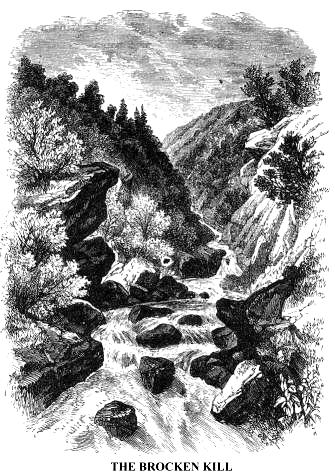 A little below the Brocken Kill, at Flat Point, is one of those tunnels and
deep rock cuttings so frequently passed along the entire line of the Hudson
River Railway; and in the river opposite is a picturesque island called Iona,
containing about 800 acres of land, including a marsh meadow of 200 acres.
Only about forty acres of the island proper, besides, is capable of tillage.
It lies within the triangle formed by the Donder Berg, Anthony's Nose, and
Bear Mountain. There we spent an hour pleasantly and profitably with the proprietor,
C.W. Grant, M.D., who resided there, and was extensively engaged in the propagation
of grapevines and choice fruit-trees. He had a vineyard of twenty acres, from
2,000 to 3,000 bearing pear-trees, and small fruit of every kind. He had eleven
propagation houses, and produced more grape and other fruit-plants than all
other establishments in the United States combined.
A little below the Brocken Kill, at Flat Point, is one of those tunnels and
deep rock cuttings so frequently passed along the entire line of the Hudson
River Railway; and in the river opposite is a picturesque island called Iona,
containing about 800 acres of land, including a marsh meadow of 200 acres.
Only about forty acres of the island proper, besides, is capable of tillage.
It lies within the triangle formed by the Donder Berg, Anthony's Nose, and
Bear Mountain. There we spent an hour pleasantly and profitably with the proprietor,
C.W. Grant, M.D., who resided there, and was extensively engaged in the propagation
of grapevines and choice fruit-trees. He had a vineyard of twenty acres, from
2,000 to 3,000 bearing pear-trees, and small fruit of every kind. He had eleven
propagation houses, and produced more grape and other fruit-plants than all
other establishments in the United States combined.
Iona is upon the dividing line of temperature. The sea breeze
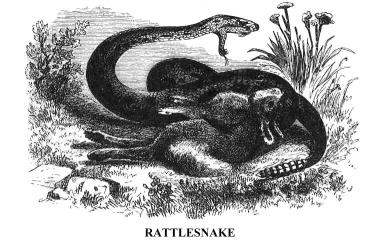 stops here,
and its effects are visible upon vegetation. The season is two weeks earlier
than at Newburgh, only fourteen miles northward, above the Highlands. It is
at the lower entrance to this mountain range. The width of the river between
it and Anthony's Nose is only three-eighths of a mile--less than at any other
point below Albany. The water is deep, and the tidal currents are so swift,
that this part of the river is called "The Race."
stops here,
and its effects are visible upon vegetation. The season is two weeks earlier
than at Newburgh, only fourteen miles northward, above the Highlands. It is
at the lower entrance to this mountain range. The width of the river between
it and Anthony's Nose is only three-eighths of a mile--less than at any other
point below Albany. The water is deep, and the tidal currents are so swift,
that this part of the river is called "The Race."
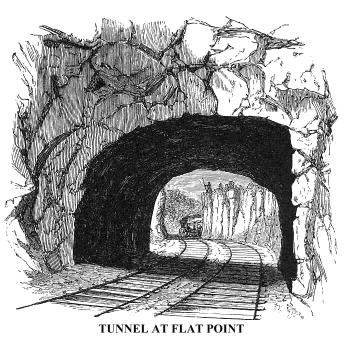 Southward
from Iona, on the western shore of the river, rises the rocky Donder Berg,
or Thunder Mountain, where, in summer, the tempest is often seen brooding.
"The captains of the river craft," says Irving, in his legend of
"The Storm-Ship," "talk of a little bulbous-bottomed Dutch
goblin, in trunk hose and sugar-loafed hat, with a speaking-trumpet in his
hand, which, they say, keeps the Donder Berg. They declare that they have
heard him, in stormy weather, in the midst of the turmoil, giving orders in
Low Dutch, for the piping up of a fresh gust of wind, or the rattling off
of another thunder-clap. That sometimes he has been seen surrounded by a crew
of little imps, in broad breeches and short doublets, tumbling head over heels
in the rack and mist, and playing a thousand gambols in the air, or buzzing
like a swarm of flies about Anthony's Nose; and that, at such times, the hurry-scurry
of the storm was always greatest. One time a sloop, in passing by the Donder
Berg, was overtaken by a thunder-gust, that came scouring round the mountain,
and seemed to burst just over the vessel. Though tight and well ballasted,
she laboured dreadfully, and the water came over the gunwale. All the crew
were amazed, when it was discovered that there was a little white sugar-loaf
hat on the mast-head, known at once to be the hat of the Heer of the Donder
Berg.
Southward
from Iona, on the western shore of the river, rises the rocky Donder Berg,
or Thunder Mountain, where, in summer, the tempest is often seen brooding.
"The captains of the river craft," says Irving, in his legend of
"The Storm-Ship," "talk of a little bulbous-bottomed Dutch
goblin, in trunk hose and sugar-loafed hat, with a speaking-trumpet in his
hand, which, they say, keeps the Donder Berg. They declare that they have
heard him, in stormy weather, in the midst of the turmoil, giving orders in
Low Dutch, for the piping up of a fresh gust of wind, or the rattling off
of another thunder-clap. That sometimes he has been seen surrounded by a crew
of little imps, in broad breeches and short doublets, tumbling head over heels
in the rack and mist, and playing a thousand gambols in the air, or buzzing
like a swarm of flies about Anthony's Nose; and that, at such times, the hurry-scurry
of the storm was always greatest. One time a sloop, in passing by the Donder
Berg, was overtaken by a thunder-gust, that came scouring round the mountain,
and seemed to burst just over the vessel. Though tight and well ballasted,
she laboured dreadfully, and the water came over the gunwale. All the crew
were amazed, when it was discovered that there was a little white sugar-loaf
hat on the mast-head, known at once to be the hat of the Heer of the Donder
Berg. 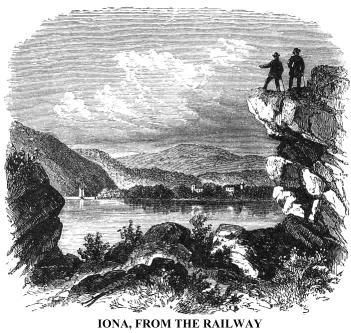 Nobody,
however, dared to climb to the mast-head, and get rid of this terrible hat.
The sloop continued labouring and rocking, as if she would have rolled her
mast overboard, and seemed in continual danger, either of upsetting, or of
running on shore. In this way she drove quite through the Highlands, until
she had passed Pollopel's Island, where, it is said, the jurisdiction of the
Donder Berg potentate ceases. No sooner had she passed this bourne, than the
little hat sprung up into the air like a top, whirled up all the clouds into
a vortex, and hurried them back to the summit of the Donder Berg, while the
sloop righted herself, and sailed on as quietly as if in a mill-pond. Nothing
saved her from utter wreck but the fortunate circumstance of having a horse-shoe
nailed against the mast--a wise precaution against evil spirits, since adopted
by all the Dutch captains that navigate this haunted river.
Nobody,
however, dared to climb to the mast-head, and get rid of this terrible hat.
The sloop continued labouring and rocking, as if she would have rolled her
mast overboard, and seemed in continual danger, either of upsetting, or of
running on shore. In this way she drove quite through the Highlands, until
she had passed Pollopel's Island, where, it is said, the jurisdiction of the
Donder Berg potentate ceases. No sooner had she passed this bourne, than the
little hat sprung up into the air like a top, whirled up all the clouds into
a vortex, and hurried them back to the summit of the Donder Berg, while the
sloop righted herself, and sailed on as quietly as if in a mill-pond. Nothing
saved her from utter wreck but the fortunate circumstance of having a horse-shoe
nailed against the mast--a wise precaution against evil spirits, since adopted
by all the Dutch captains that navigate this haunted river.
"There is another story told of this foul-weather urchin, by Skipper Daniel Ouslesticker, of Fish Kill, who was never known to tell a lie. He declared that, in a severe squall, he saw him seated astride of his bowsprit, riding the sloop ashore, full butt against Anthony's Nose, and that he was exercised by Dominic Van Geisen, of Esopus, who happened to be on board, and who sang the hymn of St. Nicholas, whereupon the goblin threw himself up in the air like a ball, and went off in a whirlwind, carrying away with him the nightcap of the Dominic's wife, which was discovered the next Sunday morning hanging on the weather-cock of Esopus church steeple, at least forty miles off. Several events of this kind having taken place, the regular skippers of the river for a long time did not venture to pass the Donder Berg without lowering their peaks, out of homage to the Heer of the Mountains; and it was observed that all such as paid this tribute of respect were suffered to pass unmolested."
We have observed that the tempest is often seen brooding upon
the Donder Berg in summer. We give a sketch of one of those scenes, drawn
by the writer several years ago, when the steam-engine of an immense pumping
apparatus was in operation at Donder Berg Point. Concerning that engine and
its co-workers, there is a curious tale of mingled fraud, superstition, credulity,
and "gullibility," that vies with many a plot born in the romancer's
brain. It cannot be told here. The simple outlines are, that some years ago
an iron cannon was, by accident, brought up from the river depths at this
point. Some speculator, as the story goes, at once conceived a scheme of fraud,
for the success of which he relied on the average ignorance and credulity
of mankind. It was boldly proclaimed, in the face of recorded history, that
Captain Kidd's piratical vessel was sunken in a storm at this spot with untold
treasures on board, and that one of his cannons had been raised. Further,
that the deck of his vessel had been penetrated by a very long augur, hard
substances encountered by it, and pieces of silver brought up in its thread--the
evidence of coffers of specie below. This augur with its bits of silver was
exhibited, and the story believed. A stock company was formed. Shares were
readily taken. The speculator was chief manager. A coffer dam was made over
the supposed resting-place of the treasure-ship. A steam-engine and huge pumps,
driven by it, were set in motion. Day after day, and month after month, the
work went on. One credulous New York merchant invested 20,000 dollars in the
scheme. The speculator took large commissions. Hope failed, the work stopped,
and nothing now 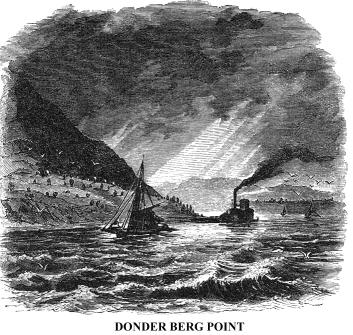 remains
to tell the tale but the ruins of the coffer dam and the remains of the pumps,
which may be seen almost on a level with the surface of the river, at high
water.
remains
to tell the tale but the ruins of the coffer dam and the remains of the pumps,
which may be seen almost on a level with the surface of the river, at high
water.
The true history of the cannon found there is, probably, that it is one of several captured by the Americans at Stony Point, just below, in 1779. They attempted to carry the cannon on galleys (flat boats) to West Point. According to the narrative of a British officer present, a shot from the Vulture sloop-of-war sunk one of the boats off Donder Berg Point. This cannon, probably, went to the bottom of the river at that time. And so vanishes the right of any of Kidd's descendants to that old cannon.
A few weeks after my visit to the Donder Berg and its vicinity, I was again at Peek's Kill, and upon its broad and beautiful bay. But a great change had taken place in the aspect of the scene. The sober foliage of late autumn had fallen, and where lately the most gorgeous colours clothed the lofty hills in indescribable beauty, nothing but bare stems and branches, and grey rugged rocks, were seen, shrouded in the snow that covered hill and valley, mountain and plain. The river presented a smooth surface of strong ice, and winter, with all its rigours, was holding supreme rule in the realm of nature without.
It was evening when I arrived at Peek's Kill--a cold, serene, moonlight evening. Muffled in a thick cloak, and with hands covered by stout woolen gloves, I sallied out to transfer to paper and fix in memory the scene upon Peck's Kill (or Peek's Kill Creek, as it is erroneously written), of which I had obtained a glimpse from the window of the railway-car. The frost bit sharply, and cold keen gusts of wind came sweeping from the Highlands, while I stood upon the causeway at the drawbridge at the mouth of Peek's Kill, and made my evening sketch.* All was cold, silent, glittering, and solitary, except a group of young skaters, gliding spectre-like in the crisp night air, their merry laughter ringing out clear and loud when one of the party was made to "see stars"--not in the black arch above--as his head took the place of his heels upon the ice. The form of an iron furnace, in deep shadow, on the southern side of the creek, was the only token of human labour to be seen in the view, except the cabin of the drawbridge keeper at my side.
A little north of Peek's Kill Hollow, as the valley is called
by the inhabitants, is another, lying at the bases 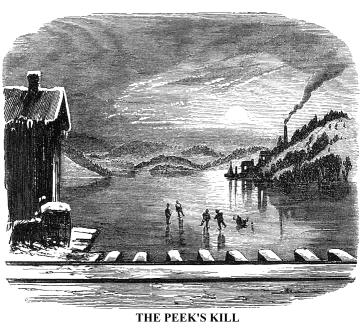 of
the rugged Highlands, called the Canopus Hollow. It is a deep, rich, and interesting
valley, through which flows the Canopus Creek. In its bosom is pleasant little
Continental Village, so named in the time of the Revolution because the hamlet
there was made a depôt for Continental or Government cattle and stores.
These were destroyed, three days after the capture of Forts Clinton and Montgomery,
by Governor Tyron, at the head of a hand of German mercenaries known as Hessians,
because a larger portion of the German troops, hired by the British Government
to assist in crushing the rebellion in America, were furnished by the Prince
of Hesse Cassel. Tryon, who had been governor of the colony of New York, and
was now a brigadier in the royal army, hated the Americans intensely. He really
seemed to delight in expeditions of this kind, having almost destroyed Danbury,
in Connecticut, and East Haven, Fairfield, and Norwalk, on the borders of
Long Island Sound, in the same State. Now, after destroying the public stores
and slaughtering many cattle, he set fire to almost every house in the village.
In allusion to this, and the devastations on the Hudson, above the Highlands,
by General Vaughan, Trumbull, an American contemporary poet, wrote indignantly:--
of
the rugged Highlands, called the Canopus Hollow. It is a deep, rich, and interesting
valley, through which flows the Canopus Creek. In its bosom is pleasant little
Continental Village, so named in the time of the Revolution because the hamlet
there was made a depôt for Continental or Government cattle and stores.
These were destroyed, three days after the capture of Forts Clinton and Montgomery,
by Governor Tyron, at the head of a hand of German mercenaries known as Hessians,
because a larger portion of the German troops, hired by the British Government
to assist in crushing the rebellion in America, were furnished by the Prince
of Hesse Cassel. Tryon, who had been governor of the colony of New York, and
was now a brigadier in the royal army, hated the Americans intensely. He really
seemed to delight in expeditions of this kind, having almost destroyed Danbury,
in Connecticut, and East Haven, Fairfield, and Norwalk, on the borders of
Long Island Sound, in the same State. Now, after destroying the public stores
and slaughtering many cattle, he set fire to almost every house in the village.
In allusion to this, and the devastations on the Hudson, above the Highlands,
by General Vaughan, Trumbull, an American contemporary poet, wrote indignantly:--
"Behold, like whelps of Britain's lion,
Our warriors, Clinton, Vaughn, and Tryon,
March forth with patriotic joy
To ravish, plunder and destroy,
Great generals foremost in their nation
The journeymen of desolation,
Like Samson's foxes, each assails
Let loose with fire-brands in their tails
And spreads destruction more forlorn
Than they among Philistine corn."
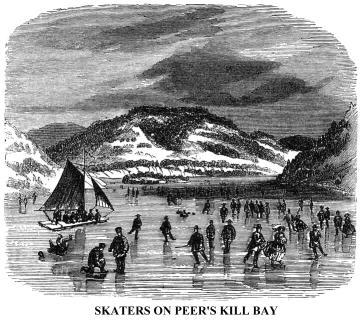 It
is proper to observe that Tryon's marauding expeditions were condemned by
the British public, and the ministry were censured by the opposition in parliament
for permitting such conduct to pass unrebuked.
It
is proper to observe that Tryon's marauding expeditions were condemned by
the British public, and the ministry were censured by the opposition in parliament
for permitting such conduct to pass unrebuked.
On the following morning, when the sun had climbed high towards meridian, I left Peek's Kill for a day's sketching and observation in the winter air. The bay was alive with people of all ages, sexes, and conditions. It was the first day since a late snow-storm that the river had offered good sport for skaters, and the navigators of ice-boats.* It was a gay scene. Wrapped in furs and shawls, over-coats and cloaks, men and women, boys and girls, were enjoying the rare exercise with the greatest pleasure. Fun, pure fun, ruled the hour. The air was vocal with shouts and laughter; and when the swift ice-boat, with sails set, gay pennon streaming, and freighted with a dozen boys and girls, came sweeping gracefully towards the crowd,--after making a comet-like orbit of four or five miles to the feet of the Donder Berg, Bear Mountain, and Anthony's Nose,--there was a sudden shout, and scattering, and merry laughter, that would have made old Scrooge, even before his conversion, tremulous with delight, and glowing with desires to be a boy again and singing Christmas Carols with a hearty good-will. I played the boy with the rest for awhile, and then, with long strides upon skates, my satchel with portfolio slung over my shoulder, I bore away towards the great lime-kilns on the shores of Tomkins's Cove, on the western side of the river, four or five miles below.
Copyright © 1998, -- 2004. Berry Enterprises. All rights reserved. All items on the site are copyrighted. While we welcome you to use the information provided on this web site by copying it, or downloading it; this information is copyrighted and not to be reproduced for distribution, sale, or profit.